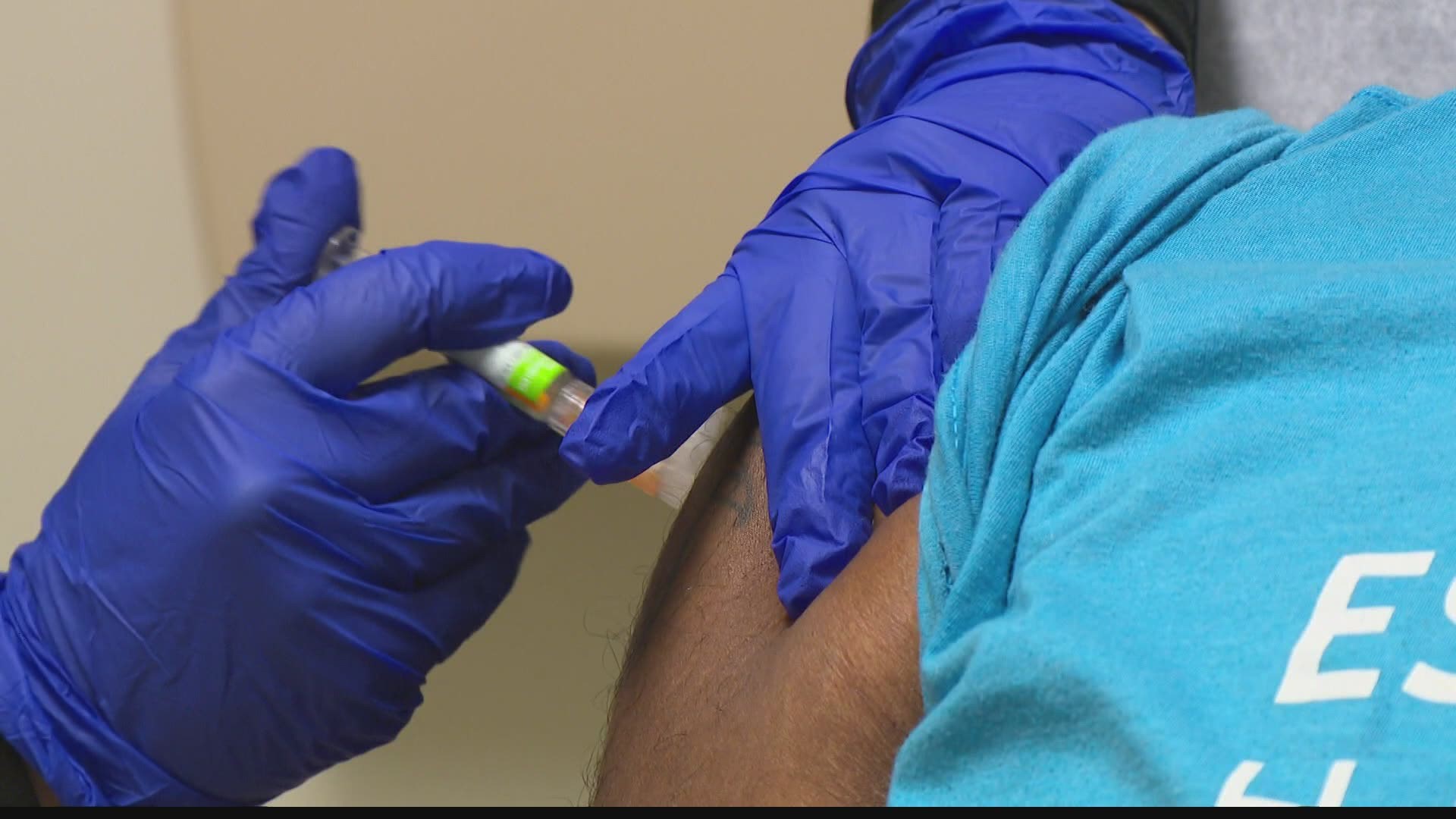INDIANAPOLIS — Thursday's latest updates on the coronavirus pandemic.
ISDH update
The Indiana State Department of Health reports 920 new COVID-19 cases for a total of 114,236 since the pandemic began.
There are was also 17 more deaths reported for a total of 3,322.
Another 870,000 filed unemployment claims last week as layoffs remain high
The number of people seeking U.S. unemployment aid rose slightly last week to 870,000, a historically high figure that shows that the viral pandemic is still squeezing restaurants, airlines, hotels and many other businesses six months after it first erupted.
The figure coincides with evidence that some newly laid-off Americans are facing delays in receiving unemployment benefits as state agencies intensify efforts to combat fraudulent applications and clear their pipelines of a backlog of jobless claims.
California has said it will stop processing new applications for two weeks as it seeks to reduce backlogs and prevent fraudulent claims. Pennsylvania has found that up to 10,000 inmates are improperly receiving aid.
The Labor Department said Thursday that the number of people who are continuing to receive unemployment benefits declined to 12.6 million. The steady decline in that figure over the past several months reflects that some of the unemployed are being re-hired. Yet it also indicates that others have exhausted their regular jobless aid, which last six months in most states.
Latest US, world numbers
There have been more than 6.93 million confirmed cases of COVID-19 in the U.S. as of 3:30 a.m. ET Thursday, according to Johns Hopkins University. There have been more than 201,000 deaths and 2.67 million people recovered.
Worldwide, there have been 31.87 million confirmed cases with more than 976,000 deaths and 21.97 million recoveries.
The real number of people infected by the virus around the world is believed to be much higher — perhaps 10 times higher in the U.S., according to the Centers for Disease Control and Prevention — given testing limitations and the many mild cases that have gone unreported or unrecognized.
For most people, the coronavirus causes mild or moderate symptoms. For some, especially older adults and people with existing health problems, it can cause more severe illness like pneumonia, or death.
State to enter Stage 5 of reopening
Gov. Eric Holcomb and state leaders provided an update on the state response to COVID-19.
The governor said the 7-day positivity rate is hovering around 4 percent, which is a great improvement. The state is also testing around 15,000 people per day.
Holcomb said the state is now ready to enter Stage 5 of the reopening plan. That will begin Saturday Sept. 26 and last through Oct. 17.
Stage 5 changes:
- A mask mandate will continue.
- Size limitations will be removed for gatherings and meetings. Organizers of events with more than 500 people will need to submit a written plan to the local health department.
- Restaurants and bars that serve food can open at full capacity. Appropriate social distancing will need to be maintained. A bar section must have people seated.
- Bars and nightclubs can open at full capacity. Customers must be seated, and social distancing is required.
- Indoor and outdoor venues can open at full capacity.
- Senior centers and congregate nutrition sites may reopen according to FSSA guidance.
- Personal services, gyms, fitness centers and workout facilities may resume normal operations.
- Nursing homes and assisted living facilities are required to provide visitation opportunities.
Children's Museum to offer free flu shots Oct. 1
The COVID-19 threat will extend into this year's normal flu season, so health professionals are strongly advising families to get vaccinated against influenza not only to protect them from the possibility of contracting the flu, but also to help hospitals and healthcare facilities avoid overcrowding.
The Children’s Museum of Indianapolis is partnering with Riley Children’s Hospital at Indiana University Health to give parents and guardians the opportunity to get entire families vaccinated against influenza free of charge while also enjoying family time at the museum.
Vaccines will be administered for free Thursday, Oct. 1 between 4-8 p.m. to the first 500 people who pay to visit the museum. Admission is just $5 that night. Children under 2 are free. Visitors need to purchase tickets in advance at www.childrensmuseum.org or by calling the box office at 317-334-4000.
Children and adults cannot show any signs of illness or other medical conditions. Adults will be required to sign vaccine consent forms for anyone under 18. Everyone is encouraged to consult with their personal physician before receiving vaccinations.
Visitors should wear loose fitting clothing around their arms to receive the shot. Museum staff will monitor the line of people waiting for vaccinations to ensure proper social distancing. The museum requires all visitors 2 and older to wear masks unless they have a medical exemption.
How can I tell the difference between the flu and COVID-19?
How can I tell the difference between the flu and COVID-19?
According to the Associated Press, it’s impossible to tell without a test. Influenza and COVID-19 have such similar symptoms, you may need to get tested to know what's making you miserable.
Body aches, sore throat, fever, cough, shortness of breath, fatigue and headaches are symptoms shared by the two.
One difference? People with the flu typically feel sickest during the first week of illness. With COVID-19, people may feel the worst during the second or third week, and they may be sicker for a longer period.
Another difference: COVID-19 is more likely than the flu to cause a loss of taste or smell. But not everyone experiences that symptom, so it’s not a reliable way to tell the viruses apart.
That leaves testing, which will become more important as flu season ramps up this fall in the Northern Hemisphere. Doctors will need to know test results to determine the best treatment.
It’s also possible to be infected with both viruses at the same time, said Dr. Daniel Solomon, an infectious diseases expert at Brigham and Women’s Hospital and Harvard Medical School in Boston.
Whether you get tested for one or both viruses may depend on how available tests are and which viruses are circulating where you live, he said.
Both the flu and coronavirus spread through droplets from the nose and mouth. Both can spread before people know they are sick. The flu has a shorter incubation period — meaning after infection it can take one to four days to feel sick — compared to the coronavirus, which can take two to 14 days from infection to symptoms.
On average, COVID-19 is more contagious than flu. But many people with COVID-19 don’t spread the virus to anyone, while a few people spread it to many others. These “superspreader events” are more common with COVID-19 than flu, Solomon said.
Preventing the flu starts with an annual flu shot tailored to the strains of the flu virus that are circulating. Health officials would like to see record numbers of people get flu shots this year so hospitals aren’t overwhelmed with two epidemics at once.
There’s no vaccine yet for COVID-19, although several candidates are in the final testing stages.
Precautions against COVID-19 — masks, social distancing, hand-washing — also slow the spread of the flu, so health officials hope continued vigilance could lessen the severity of this year's flu season.
Disney delays 'Black Widow,' Spielberg's 'West Side Story' to 2021
The Walt Disney Co. has further postponed its next mega-movies from Marvel, including “Black Widow,” while also postponing Steven Spielberg's “West Side Story” a full year in the company's latest recalibration due to the pandemic.
Ten of Disney's top films shuffled release dates Wednesday, uprooting several of the company's major fall releases. The Scarlett Johansson Marvel movie “Black Widow,” last set for Nov. 6, heads to May 7 of next year. Instead of opening next month, Kenneth Branagh's murder mystery “Death on the Nile" moves to Dec. 18. That was the date set for “West Side Story,” but Spielberg's musical will instead debut in December 2021.
Disney didn't entirely abandon the season. The Pixar release “Soul” remains on the calendar for late November. “The Empty Man," a horror release from the former 20th Century Fox, is moving up from December to Oct. 23.
But the delays of Disney's upcoming blockbusters reinforce the growing exodus from 2020 among the blockbusters that hadn't already uprooted to next year. Following tepid ticket sales for Warner Bros.' “Tenet” in a U.S. theatrical marketplace where about 30% of cinemas remain closed, Warner Bros.' “Wonder Woman 1984” moved from October to Christmas and Universal Pictures' “Candyman” postponed to next year.
Given the interconnected nature of Marvel releases, the latest delay of “Black Widow” had a domino effect on other films. Destin Daniel Cretton's “Shang Chi and the Legend of the Ten Rings,” starring Simu Liu as the martial arts hero, is now slated for July 9, 2021, instead of May 7. Chloé Zhao “Eternals,” with Angelina Jolie, Gemma Chan and Kumail Nanjiani, moves from February to Nov. 5, 2021.
The Ben Affleck-Ana de Armas thriller “Deep Water” was also pushed from November until August next year.
Times Square New Year's Eve will be 'very different,' mostly virtual this year
New Year's Eve in Times Square will incorporate virtual elements, organizers said Wednesday as they gear up for a celebration that will have to be scaled down and socially distant in response to the coronavirus.
Details are still coming together, but the Times Square Alliance, Jamestown Properties and Countdown Entertainment said in a news release that the annual event will have an extremely limited group of in-person honorees.


A virtual experience will be created to allow people to take part in the countdown to 2021 from wherever they are, organizers said.
The event will honor essential workers and others who have made a difference in 2020, they said.
Organizers said attendance in Times Square will be "pre-determined and extremely limited due to COVID-19 restrictions," so they're working on ways for people to participate virtually wherever they are.


